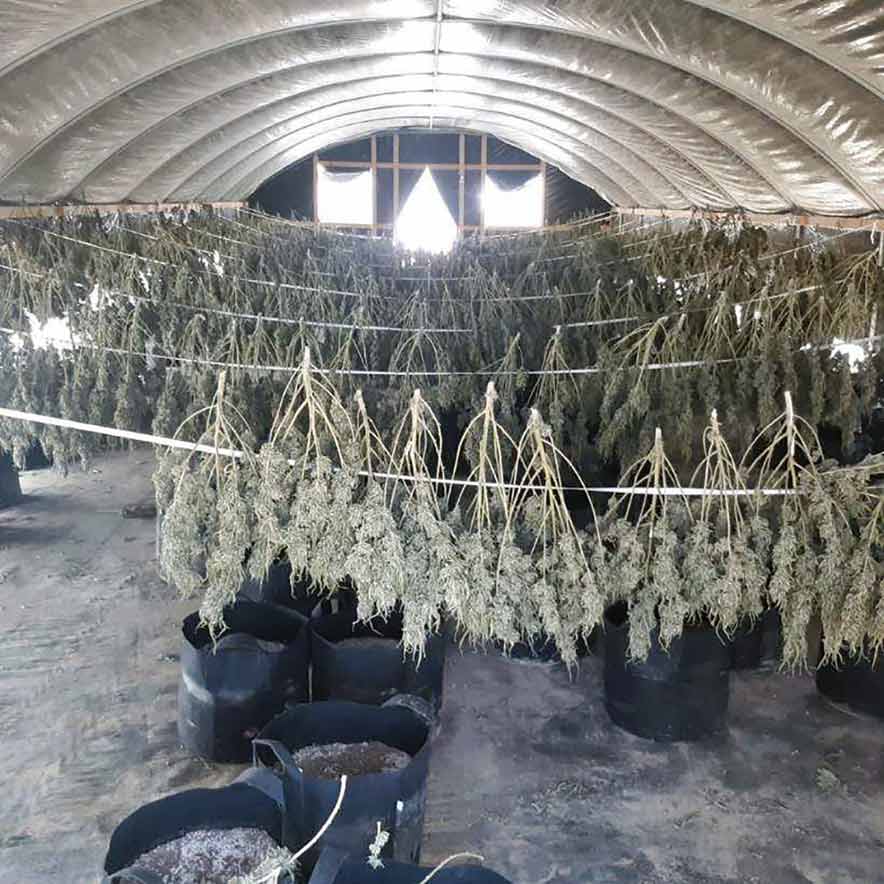
- Details
- By Native News Online Staff
WINDOW ROCK, Ariz. — The Navajo Nation is aggressively going after farmers who are allegedly growing hemp or marijuana on the Navajo Nation, the country’s largest reservation.
Navajo Nation Attorney General Doreen N. McPaul announced that the Navajo Nation filed a lawsuit on Wednesday in the Shiprock District Court against all known farmers who are growing hemp and/or marijuana in violation of Navajo law.
All forms of hemp and marijuana are illegal on the Navajo Nation.
In the lawsuit, the Navajo Nation alleges that these defendants possess or control Navajo lands that are being used to illegally grow, produce, manufacture, transport, or sell industrial hemp and/or marijuana.
These actions, according to the lawsuit, are irreparably injuring and contaminating the Nation’s lands, waters, and other natural resources.
“Despite legislation that clearly illegalizes hemp and marijuana on the Navajo Nation, many farmers have chosen to jeopardize their farms and the health of the community by growing and producing hemp and marijuana for personal gain,” said Attorney General McPaul. “These individuals have substantially injured the community and the Nation, as a whole, by illegally drilling wells to water their hemp and marijuana plants, by illegally dumping and burying solid waste, by carelessly storing and applying hazardous pesticides on their lands, and installing ill-constructed septic tanks that are leaking sewage into our lands and groundwater.”
The Navajo Nation adopted Resolution No. CS-76-20 on Oct. 5, 2020, to categorize “all parts of the plant Cannabis sativa L.” as “marijuana.” Possession or distribution of marijuana is a criminal offense under the Navajo Nation Code.
Although the amount of delta-9 tetrahydrocannabinol no longer differentiates hemp from marijuana, Navajo law exempts hemp with a concentration of less than 0.3 percent dry weight when cultivated under a specially created and regulated pilot project between the Navajo Agricultural Products Industry (NAPI) and New Mexico State University, or pursuant to a regulatory system created by the Navajo Nation for industrial hemp cultivation and production. No such regulatory system currently exists and, except for the NAPI pilot project.
This is the second lawsuit the Navajo Nation has brought to stop hemp and/or marijuana operations, having originally sued Dineh Benally and two of his unregistered entities in June 2020. On Sept. 18, 2020, the Shiprock District Court issued a temporary restraining order and preliminary injunction enjoining Benally and his “officers, agents, servants, employees and those persons in active concert or participation with” Benally from growing or cultivating hemp on the Navajo Nation. Since then, the Navajo Nation Police Department has worked tirelessly to enforce the injunction, but individual farmers have continued to grow, harvest, and transport hemp and/or marijuana.
The 33 farmers named as Defendants by the Navajo Nation include; Farley BlueEyes, Deana Alvarado, Gilbert Bedonie, William Bedonie, Richard Begaye (aka Richard Begay), Donald Benally, Margaret Benally (aka Marjorie Benally), Marcus Benally (aka Markus Benally), Winston Benally, Lula Boy, Grace Chavez, Harrison Cly, Jimmie Coolidge (Jimmy Coolidge), David Devore, Marcus Field, Margaret Harrison, Anita Hayes, Perry Hayes, Robin Hayes, Robert Hayes, Freddie Hobson, Larry Jack, Austin Jim, Fernando Jim, Jean Jones, Donald Kee, Kathy Manis, Sherrel Mesa, Lynette Muttes, Louise Pettigrew, Ronnie Ross, Gene Sherrell, and Nita Yazzie. A conformed copy of the complaint will be available on the Navajo Nation Department of Justice website as soon as it is available from the Shiprock District Court.
The Navajo Nation is represented in this case by Charlie Galbraith and Krystalyn Kinsel of Jenner & Block. They are both enrolled citizens of the Navajo Nation.
More Stories Like This
Native News Weekly (August 25, 2024): D.C. BriefsMonday Morning: (February 16, 2026): Articles You May Have Missed This Past Weekend
US Presidents in Their Own Words Concerning American Indians
Osage Nation Mourns the Passing of Former Principal Chief Jim Gray
Native News Weekly (February 15, 2026): D.C. Briefs
Help us defend tribal sovereignty.
At Native News Online, our mission is rooted in telling the stories that strengthen sovereignty and uplift Indigenous voices — not just at year’s end, but every single day.
Because of your generosity last year, we were able to keep our reporters on the ground in tribal communities, at national gatherings and in the halls of Congress — covering the issues that matter most to Indian Country: sovereignty, culture, education, health and economic opportunity.
That support sustained us through a tough year in 2025. Now, as we look to the year ahead, we need your help right now to ensure warrior journalism remains strong — reporting that defends tribal sovereignty, amplifies Native truth, and holds power accountable.
 The stakes couldn't be higher. Your support keeps Native voices heard, Native stories told and Native sovereignty defended.
The stakes couldn't be higher. Your support keeps Native voices heard, Native stories told and Native sovereignty defended.
Stand with Warrior Journalism today.
Levi Rickert (Potawatomi), Editor & Publisher

